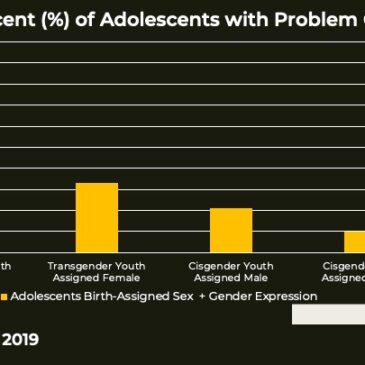Kids who are exposed to gambling as adolescents are at higher risk for gambling problems in adulthood. However, most scientific research reports gender differences in gambling within a binary framework – male or female. This framework does not make the distinction between birth assigned sex and gender expression, and therefore erases the identities and experiences of transgender and gender non-conforming people. Nic Rider and colleagues worked to fill in the gap in problem gambling research by highlighting the experiences of transgender and gender diverse adolescents and comparing them to their cisgender counterparts.
What was the research question?
What are the rates of gambling and problem gambling among youth whose gender identity does not match up with their sex assigned at birth (i.e., transgender)?
What did the researchers do?
The researchers performed a secondary analysis of the 2016 Minnesota Student Survey (MSS). They focused on the subset of nearly 81,000 participants (i.e., 9th and 11th graders) who were asked questions about their gender identity. If students answered “yes” to, “Do you consider yourself transgender, genderqueer, genderfluid, or unsure about your gender identity?” Rider and colleagues included them in the transgender group. If they answered “no” to this question, then the researchers classified them as cisgendered. The survey asked questions about the students’ gambling behaviors over the past year, such as gambling activities and frequency. The survey screened for problem gambling using the 3-item Brief Adolescent Gambling Screen.
The researchers used Chi-squared analyses to compare sociodemographic characteristics, past-year gambling behaviors, and problem gambling screens between students who identified as transgender and students who identified as cisgendered.
What did they find?
Approximately 2.7% of the youth surveyed identified as transgender. Transgender students were more likely to report being assigned female at birth, being a youth of color, and receiving free/reduced price lunch than their cisgender peers. All youth had similar rates of past-year gambling behavior regardless of gender identity. However, a larger proportion of transgender youth screened positive for gambling problems when compared to cisgender youth (5.7% vs. 1.8%, respectively). In particular, transgender youth assigned male at birth were at much greater risk for screening positive for problem gambling than cisgender youth assigned either female or male (8.9% vs. 1.0-2.1%, see Figure).1

Figure. The percent of adolescents who screened positive for problem gambling by birth-assigned sex and gender identity. Click image to enlarge.
Why do these findings matter?
This study is one of the few that looks at adolescent gambling outside of a binary gender scope. Including comparisons between transgender and cisgender adolescents allows for greater knowledge of the rates of gambling behavior and problem gambling among transgender youth. It is possible that during the difficult time of adolescence, whether it be puberty and the incongruence of body changes not aligning with gender identity, or social pressure to conform, transgender youth may seek to manage their distress and discomfort in maladaptive ways like gambling. Prior studies have shown that adolescent gambling is associated with adulthood gambling involvement. Therefore, it is important to identify these problems early and develop specific interventions for this at-risk population.
Every study has limitations. What are the limitations in this study?
This study is based on a self-report survey; therefore, it is limited by the accuracy of the responses from the students. Additionally, the survey grouped any student who did not identify as cisgender into one category – this included transgender, genderqueer, gender fluid, and those who were unsure. The researchers essentially made comparisons between cisgender and non-cisgender students and were unable to differentiate any results to specific gender identity.
For more information:
Are you worried that you or someone you know has an addiction? The SAMHSA National Helpline is a free treatment and information service available 24/7. For more details about addiction, visit our Addiction Resources page.
Health professionals and addiction specialists have been increasingly focused on mental health as it pertains to COVID-19. They have assembled resources specific to COVID-19-related concerns, as well as resources on addictive behaviors in general, which can be found on the National Institute on Drug Abuse and Centers for Disease Control and Prevention websites.
If you or someone you know identifies as trangender or non-cisgender, you can visit GLAAD for a full list of information and resources.
— Karen Amichia
What do you think? Please use the comment link below to provide feedback on this article.
________________
[1] The researchers reported two cutoff scores for the Brief Adolescent Gambling screen: 2+ questions endorsed and 4+ questions endorsed. This article presents the results based on the 4+ cutoff.




